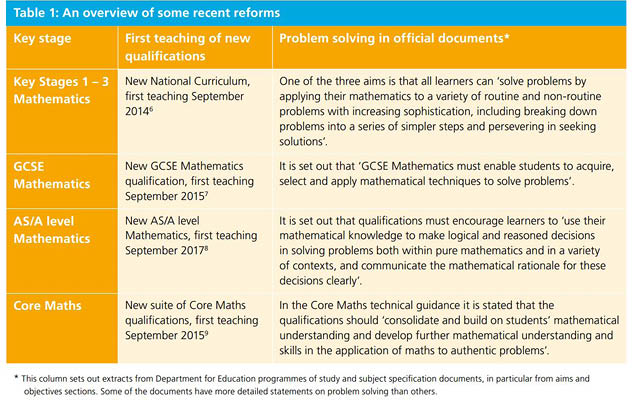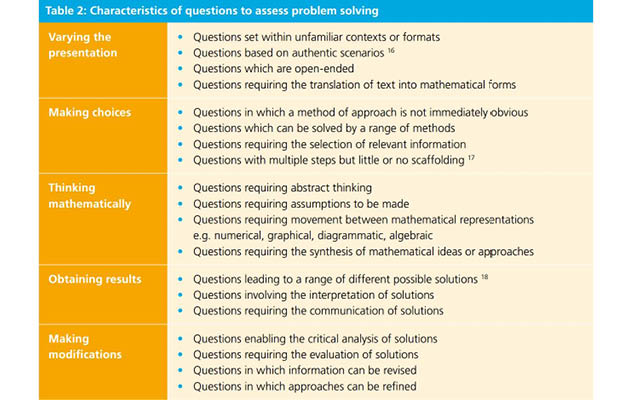I believe Albert Einstein was once asked “If you have one hour to save the world, how would you spend that hour?”
He replied, “I would spend 55 minutes defining the problem and then five minutes solving it.”
When asking 20 mathematics teachers to define problem solving you are likely to get 21 different definitions. In its recent report Problem solving in mathematics: realising the vision through better assessment, ACME (the Advisory Committee on Mathematics Education) argues a single prescriptive definition is of limited merit. Instead, the report helpfully sets out an overview of where problem solving appears in official documents following the recent reforms to the mathematics curriculum:

Problem solving in mathematics is not new. Evidence suggests, contrary to many people’s view, that students in England are actually quite good at problem solving. In 2014, alongside the PISA assessments, international students were asked to take problem solving tests. Students from England were “significantly above average”- ranking 11th in the world- with only Finland in Europe outperforming our students when applying their knowledge.
Estimate how far a person is likely to walk in their lifetime.
Show details of your assumptions and calculations.
The task above is taken from an AQA specimen paper from 2014 for level 3 Mathematical studies. UK students are used to such demands, as these types of questions are already embedded in many mathematics classrooms. Dr Niall MacKay, University of York, previously stated in his blog, 'Mathematics and Problem-solving (III)',
“it's not our curriculum but our exam system that needs reform. It's pretty easy to write a curriculum that's about right. We also have many teachers who, left to themselves, will encourage the kind of disciplined enquiry that typifies the finest minds.”
The recent ACME problem solving report agrees with this statement, arguing that after recent reforms there is now substantial room for further improvements in assessment to ensure that the problem solving skills in mathematics are developed by all young people. As most mathematics teachers have already experienced, assessment of more open tasks can be a barrier to implementing problem solving successfully in lessons. Resources, such as the Bowland Maths: Assessment tasks provide sample work, suggested feedback and progression tables, however mark schemes for current formal assessment do not include space for a less prescriptive method of awarding marks. ACME recommend incremental changes in formal examinations in order to reach a goal of having questions that probe mathematical thinking, allow students to draw conclusions that avoid predictability and have choice built in.
The report states that the “nature of problem solving will vary considerably depending on the phase of mathematical development and the mathematical content being assessed”. The table below sets out the characteristics of questions that both exam boards and teachers should use to assess mathematical problem solving across all stages:

Problem solving is set to continue to be a major part of our mathematical curriculum and assessment. In autumn, the National STEM Learning Centre and Network will be offering CPD that explores the importance of reasoning and problem solving in order to meet the requirements of the new mathematics curriculum at key stages three and four. More details can be found below:
- Developing mathematical understanding through reasoning and problem solving
- Using resources to develop problem solving skills in secondary mathematics


